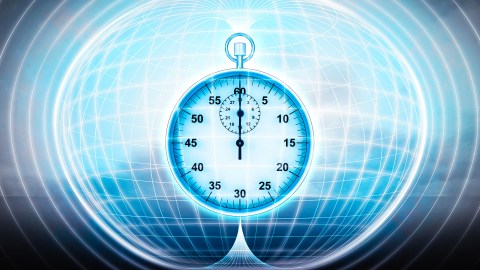Adam Frank writes:
KEY TAKEAWAYS
- When you look at a picture of a galaxy that is 75 million light-years away, you are seeing that galaxy at a time when dinosaurs ruled the Earth.
- Distance translates into time because the speed of light is finite.
- What you perceive as “now” is really layer after layer of light reaching your eye from many different moments in the past.

Light from the time of the dinosaurs
When you look at a picture of a galaxy that is 75 million light-years away, you are not seeing it as it is right now, but as it was when that light you are seeing left it 75 million years ago. That means you are seeing that galaxy at a time when dinosaurs ruled the Earth, and you were nothing but a dream in the tiny mind of the tiny mammals that existed back then.
[Or, to override the materialistic worldview of the author, we could say that 75 million years ago, we were nothing but a dream in the vast mind of God, who has existed from all eternity.]
I think everyone is familiar with this idea, and it is mind-blowing enough that everyone is happy to explore it again each time an image of a distant galaxy is released. Distance translates into time because the speed of light is finite. Therefore it always takes some time for light to cross the distance between a galaxy and your eye. A galaxy 75 million light-years away has had 75 million years to evolve since that light left and may no longer look like what we see in the image. That is incredible. (Actually, 75 million years is not enough time for galaxies to evolve much. Galaxies 10 billion light years distant are, however, another story).
So yes, everyone loves this idea. But here is the thing. You don’t need objects to be billions, millions, thousands, or even one single light year away to experience how distance translates into time. It is a constant part of your life. You are trapped in time.
False simultaneity
Consider an object sitting two meters away from you. Look up now, find one, and focus your eyes on it. Let’s say it’s a chair. Because the speed of light is 2.99 x 108 meters per second, the light your eye is detecting left that chair exactly 660 picoseconds ago. A picosecond is one trillionth of a second, and while I will grant that 660 trillionths of a second ago is pretty recent, it is still in the past. You are not seeing that chair as it is now, you are seeing it as it was. The same is true for everything else your eye detects. You never ever see the world as it is.
[Sorry to have to correct his math, but if the object is two meters from your eyes, you would be seeing it about 6700 picoseconds in the past, not 660 picoseconds.
The author continues, and raises some interesting questions.]
What you perceive as the “now” is really layer after layer of light reaching your eye from many different moments in the past. Your “now” is an overlapping mosaic of “thens.” What you imagine to be the real world existing simultaneously with you is really a patchwork of moments from different pasts. You never live in the world as it is. You only experience it as it was, a tapestry of past vintages.
Chairs, tables, houses, the moon, the stars, and the Milky Way. They are all living in different pasts, but when you stand in their assembled midst, they make up this fleeting moment of your life. How could something so real be built from such a potent illusion?
Full article at Big Think.
If we could imagine moving at the speed of light (which is not actually possible for material objects), we would be decoupled from the time experienced in this physical universe. All events in the physical universe would seem to us to be happening simultaneously–we would effectively be outside of time. Perhaps light is more fundamental than space, and the only reason we are “trapped in time” is that we have been rotated into a spatial-temporal reality in which light is only ever a fleeting visitor.